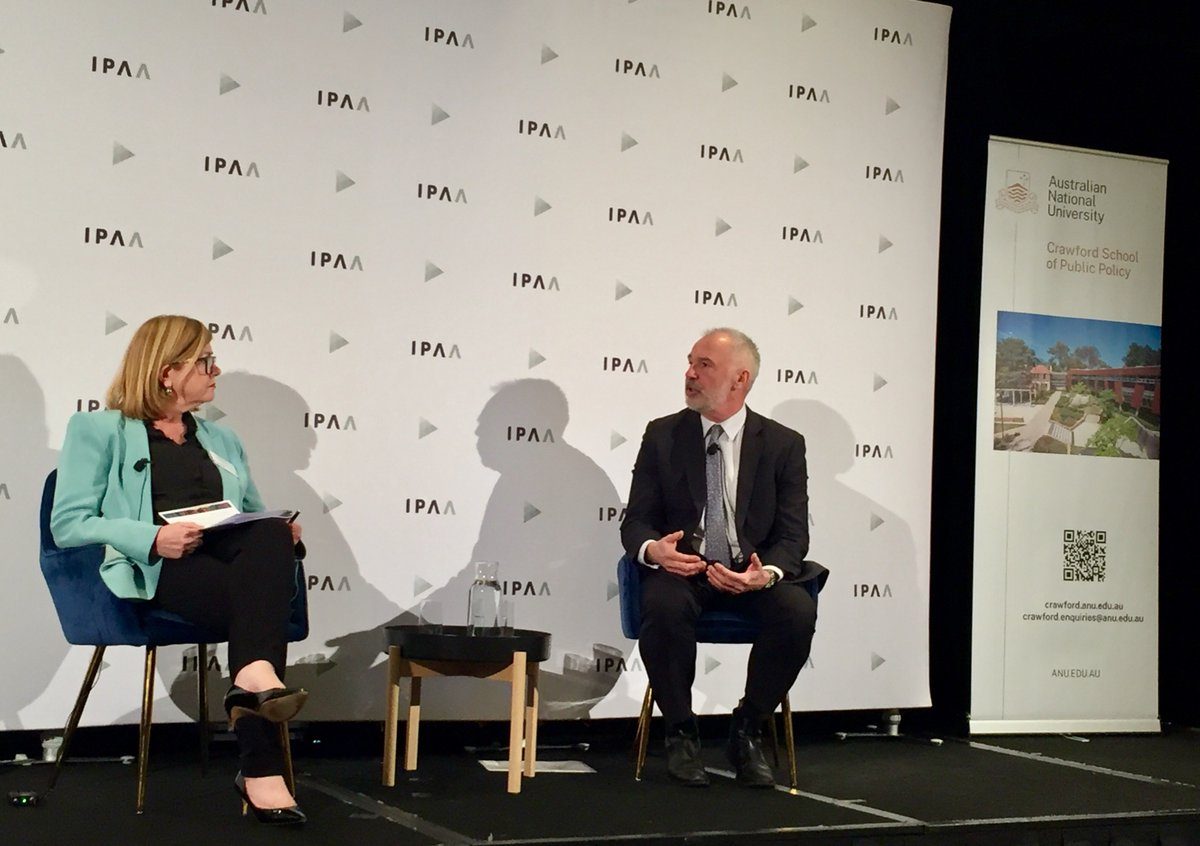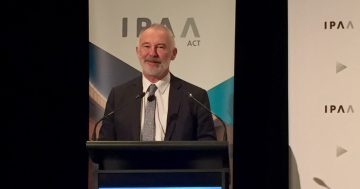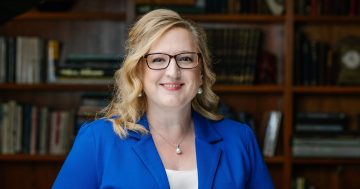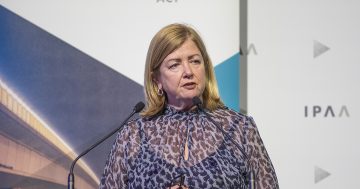
Secretary Katherine Jones interviewing Commissioner Gordon de Brouwer. Photo: ANU Crawford School.
If you think journalists interviewing journalists is an eyebrow-raising concept, what’s there to say about public servants interviewing each other?
For some years now, we have increasingly seen and heard journalists pontificating together over issues at hand, especially by the 24/7 broadcasters who have to fill in time before a press conference or some other event.
Or, even more curious, interviewing each other after the event to explain what the event was actually about.
Print and digital media do it, too (guilty), but it’s not as overt and in-your-face as talking heads on screen.
It’s easier to get one of your own than a real expert on the topic, and it’s a sure bet no one will ask their colleague an overly tough question.
In most instances, the questions are at least canvassed before the interview goes live.
But if we’re talking about navel-gazing – or simply keeping it all in the family – the public service has a take on this all of its own.
Public servants are notoriously media-shy.
There is a good reason for this. They have to not only be apolitical but also be seen to be apolitical.
There is, too, the very real matter of not risking their own jobs by angering political masters.
And there are rules and protocols about public servants in the media.
For the most part, they are the unseen engine room that allows members of parliament to take the spotlight and hopefully take responsibility.
Senior public servants do participate in occasional interviews, however, but only with approvals in place and only with trusted reporters whose professional reputations ensure no traps are lying in wait.
All of the above is fair enough and actually makes sense.
But the Australian Public Service has found a clever way around all this.
A way to be seen, get its message across, build a profile – and not be grilled too hard.
It’s all thanks to the Institute of Public Administration Australia and its brilliant Secretary Series.
IPAA’s ACT branch holds regular live events around Canberra’s various conference rooms where department secretaries and agency heads give addresses about their work and their views on the public sector.
In addition to the Secretary Series, IPAA also provides a forum for valedictories, inaugural speeches and special orations.
The addresses are invariably reflective, sometimes entertaining, and usually informative.
And they are always followed with questions from a panel of – you guessed it – other agency heads and public service leaders.
Or the post-speech questions might come in the form of a sit down with IPAA’s president, who just happens to be another department secretary.
Rooms are filled mostly with public servants whose bosses are happy to pay for a seat and are billed as being for the public service (ie, speaking to public servants).
But these events are most always reported in certain media (including this publication) and are easily accessible by the general public.
Publicity is sought and media invited.
And why not? They are excellent events and often newsworthy.
But no public service boss appearing at one of these forums is ever trembling over the thought of being asked a tough question by the panel.
Take last week’s first address from new Australian Public Service Commissioner Gordon de Brouwer, for example.
A great speech.
Dr de Brouwer is a highly skilled and well-regarded public sector leader.
Everything about his public service pedigree and the contents of his address cries decency, competence and likability.
Why wouldn’t the APS want this out there?
Following the address, there was more of the same. IPAA ACT President Katherine Jones joined Dr de Brouwer on stage for a friendly sit down chat.
Ms Jones is also Secretary of the Attorney-General’s Department – and Dr de Brouwer is also a former IPAA ACT president (when he was Department of Environment and Energy secretary).
These are friends and colleagues. It’s not an actual interview. They’re not meant to be. That’s not what these events are about.
It’s not the National Press Club, where a half-hour of grilling from reporters always follows up a speech. Leave that for the politicians.
Dorothy Dixer might be too strong a term, but the commissioner certainly wasn’t thrown (or even fazed) by anything asked of him by the president.
Ms Jones, another highly competent leader with an engaging ‘interviewing’ manner, asked a half dozen easy questions before throwing it open to the floor.
But there was only time for three of those unexpected questions. What a pity.
It seems the APS has locked onto a very good formula that allows it to be seen and heard … and not be at all controversial.
A public sector leader’s dream.



















